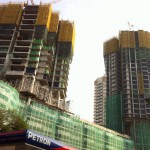Mah Sing Group wins Four Prestigious Asia Pacific Property Awards
The Asia Pacific Property Awards 2011 in association with Bloomberg Television have just been judged and Mah Sing Group has been informed that it is amongst the winning companies.
Successful entrants have been invited to attend a high profile gala presentation dinner at the Longemont Hotel Shanghai on May 31. Mah Sing Group will then discover whether the company has won a five-star or highly commended award in the categories of Best Mixed-Use Development for its Southbay City in Penang project, Best Industrial Development for its i-Parc3 at Bukit Jelutong project, Best Retail Development for its Star Avenue at Damansara project and Best Website.
Group managing director Tan Sri Datuk Sri Leong Hoy Kum, and group chief executive said of the awards, “We are very pleased that our projects have been shortlisted to be among the best in Asia Pacific. Last year our residential projects won three awards, and this year, our commercial and industrial projects have been recognised for their outstanding concepts and design. Being one of Malaysia’s most diversified property developer, this recognition is a strong testament to the high quality that we place on each of our project. We also place high emphasis on communicating with our stakeholders though various channels, and thus we are very pleased that our website has been recognised to be among the crème of the crème in the Asia Pacific region. ”
The event is part of the long established International Property Awards and its award winners’ logo is recognised as a symbol of excellence throughout the global industry. Attaining one of these coveted awards is indisputable evidence that Mah Sing Group is capable of beating some exceedingly strong contenders within the highly competitive Asia Pacific property arena.
Later this year, the highest scoring winners from the Asia Pacific Property Awards will compete against other winning companies from Europe, Africa, the Americas and Arabia to find the ultimate World’s Best in each category. The Asia Pacific region has an enviable record of achievement at international level, having scooped seven World’s Best awards in the finals of both 2009 and 2010. No doubt the property industry will be watching and waiting to see if this record number of international wins can be matched or even beaten in 2011.
The judging panel is chaired by Lord Bates of Langbaurgh and consists of more than 60 professionals whose collective knowledge of the property industry is unsurpassed by any other property awards. This year’s judges include UK account manager of Google James Bacon; group chief executive of the National Federation of Property professionals Peter Bolton King; the Royal Institute of Chartered Surveyors (RICS) David Dalby; and the Royal Bank of Scotland (RBS) Mike McNamara.
SOURCE: The Star























